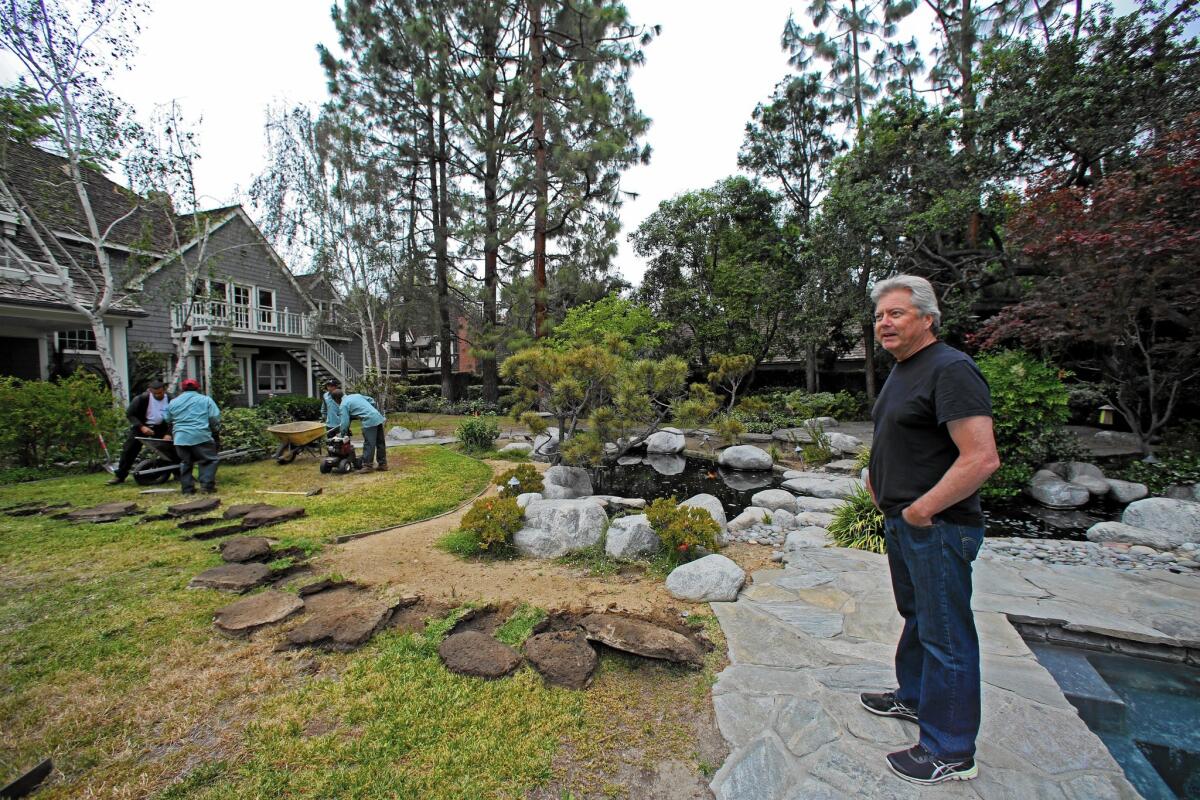Southland rebate funds to replace grass are being drained

- Share via
Demand for rebates to replace grass with drought-tolerant landscaping has overwhelmed water officials and prompted questions about the future of the highly popular program.
The Metropolitan Water District’s program, which pays homeowners and businesses $2 per square foot to replace grass, ran short of funds this month due to a surge in demand.
The MWD has received more than $330 million in applications for rebates under the program, far more than the agency’s current $100-million rebate budget. Not everyone who submits an application ends up seeking the rebates, but officials say it’s clear that more money is needed to continue the program.
The Southern California water wholesaler, which imports water from Northern California and the Colorado River, is considering increasing the rebate budget by up to $350 million. Such an increase would extend the program until the fall of this year.
“We’re trying to find the sweet spot between capitalizing on historic interest in turf removal and having a sustainable conservation rebate program,” said spokesman Bob Muir.
Demand increased dramatically after Gov. Jerry Brown last month ordered urban areas to cut water use by 25% as California has entered its fourth year of drought.
The MWD estimates that removing one square foot of grass in Southern California saves 42 gallons of water a year.
Yet some critics say the costs are too great.
Keith Lewinger and three other board members of the San Diego County Water Authority wrote a letter this month opposing an increase in funding to the program. The goal of the program was to encourage sustainable landscaping, not pay for extensive front- and backyard makeovers, Lewinger said.
“We’ve reached the tipping point, and we don’t need $2-per-square-foot incentives to get people to do this any longer,” he said. “We can’t buy our way out of the drought by removing turf. We just can’t afford it.”
But other agencies — including the Los Angeles Department of Water and Power — argue the MWD’s rebates are a crucial tool for water conservation.
Los Angeles gives residents $1.75 per square foot on top of the MWD’s rebate.
“LADWP is concerned about any major reductions in funding that may impact the viability of the turf replacement program,” said spokeswoman Michelle Figueroa. “This program greatly supports the governor’s call to reduce water use and assists local water agencies in meeting their water use targets.”
The MWD board plans to vote at a special meeting Tuesday on the budget increase as well as new limits on the rebate program.
The board is considering caps on the amount applicants can request. Currently, there are no limits.
District officials said they believe the MWD will eventually need to seek state funds and add stricter rules to the program to keep it going long-term.
Many businesses have cashed in, replacing swaths of golf courses and fields in exchange for rebates of more than $1 million. Homeowners make up the majority of applications, but the majority of funding goes to businesses for large projects.
To curb that practice, board members could elect to cap one-time residential rebates at 3,000 square feet and decrease the commercial rebate rate to $1 per square foot, with an annual limit of 25,000 square feet.
Other rebate programs have also seen funds drain. The city of San Diego, which runs a program separate from the MWD but allows customers to sign up for both, has also exhausted its funds. Spokeswoman Robyn Bullard said the program will resume July 1. The program, funded by the city and grants, has been closed and opened as funds become available.
“We are always searching for ways to further fund the program, such as grants opportunities, and are in the early stages of exploring other opportunities, such as a low-interest loan program for turf replacement,” Bullard said.
[email protected]
Twitter: @taygoldenstein
More to Read
Sign up for Essential California
The most important California stories and recommendations in your inbox every morning.
You may occasionally receive promotional content from the Los Angeles Times.











